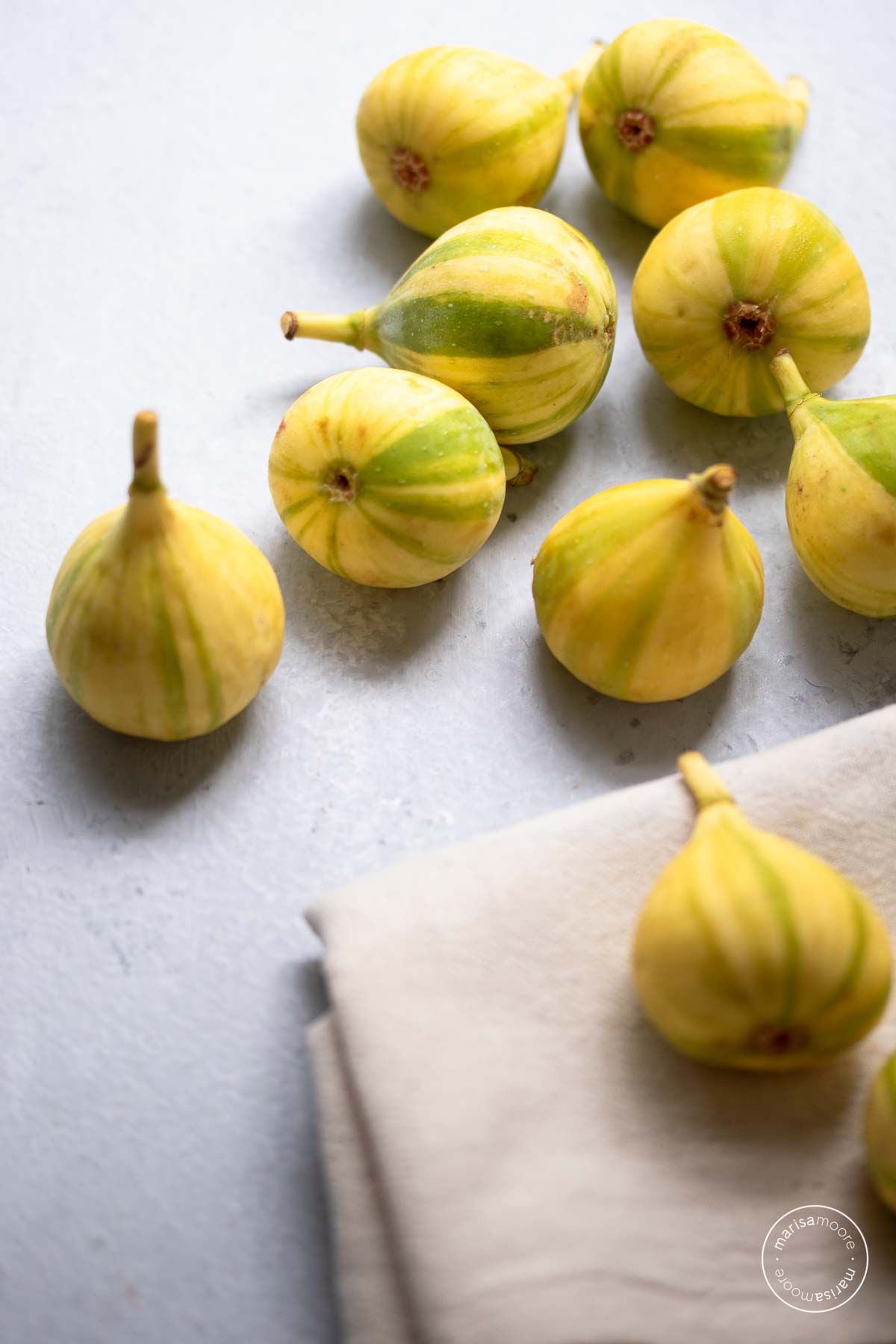Tiger figs are a naturally sweet and nutritious fruit that’s perfect for snacking and in a variety of dishes from salads to desserts and even cocktails! Learn how to eat them, where to buy them and the nutrition benefits of tiger figs.

The sweet, jammy fruit is ready to eat in late summer through early fall – just in time for healthy back to work and school routines.
What are tiger figs?
Tiger figs are a uniquely beautiful fig with a striped yellow, green and white stripes. These flavorful figs, also known as Panache, flaunt a deep fuchsia flesh inside making a stunning appearance.
Figs have been part of the Mediterranean diet for centuries. This ancient fruit comes in different varieties with colors from deep purple or brown to bright green and yellow.
How do tiger figs taste?
Tiger figs are sweet. The flavor is a cross between raspberries and watermelon with a hint of citrus. When ripe, they have a jammy texture making them perfect for sweet snacking and pairing with salty or savory ingredients like cheese.

Season
Tiger figs are in season from late summer to early fall, and can be found at many farmers markets and specialty food stores. California ones are available fresh from late July until November. These are the best months to look for them in supermarkets across the United States.
Picking perfect figs
Choose figs that are plump with smooth skin. The fruit should be soft to the touch and have a slight given when pressed.
The fruit ripens on the tree. If picked too soon, it will be firm and lack flavor.
How to eat tiger figs
Naturally sweet and flavorful, tiger figs are best eaten fresh, without cooking. They are versatile in the kitchen. Figs work in both sweet and savory recipes. I am sharing recipe ideas below to include tiger figs in your cooking.
Where to buy
Increasingly you can tiger figs at Trader Joe’s stores for a short few weeks of the season. I’ve also purchased them at Publix and specialty stores during the fall. They are not available year-round in the United States so stock up when you find them and enjoy.

Recipe ideas
- Use tiger figs to make my Fig, Goat Cheese and Arugula Flatbread.
- Fig, Walnut and Ricotta Toast: Spread ricotta on hearty toasted bread and top with sliced tiger figs. Sprinkle walnuts (or pistachios) for a delicious breakfast or snack.
- Fig and Prosciutto Salad: Combine sliced tiger figs with prosciutto, arugula, and a balsamic vinaigrette for a simple side or entree salad.
- Add to a cheese board. Pair the figs with manchego cheese for a nice treat.
- Fig and Honey Yogurt: Top Greek yogurt with sliced tiger figs and a drizzle of honey for a sweet and creamy breakfast or snack.
- Combine with Black Mission or other varieties to make a simple fig jam.
Using up extra figs
Fresh figs last about 5-7 days in the refrigerator. If you get them directly from the farm (or tree), they’ll last up to 2 weeks.
To extend the shelf life: Store in a sealed container in the refrigerator. Eat the figs as soon as possible.
Fig jam or butter is my favorite thing to make with extra figs. You can use any variety and mix them up if you’d like. Plus, when you make your own jam you can control how much sugar you add.
Try these ways to preserve your tiger figs:
Drying: Dry them in the sun or in a dehydrator. Dried figs can be used as a chewy, sweet snack or in recipes that use dried fruit. They are delicious in fall and winter grain bowls and salads like my Fig and Farro Salad.
Canning: Can fresh figs in syrup or juice to make them shelf stable. Canned figs can be used in desserts or as a topping for yogurt or ice cream.
Freezing: Freeze them whole or sliced and add to smoothies or thaw and make a fig compote, syrup or sauce.

Nutrition
Figs are not only delicious but also packed with essential nutrients that are beneficial for health. They are an excellent source of vitamins, minerals, and dietary fiber, making them an ideal snack to help you eat healthier.
Dietary Fiber
With 5g fiber in a serving of just 3-5 figs, they are a good source of fiber, which is essential for maintaining a healthy digestive system. Fiber helps regulate bowel movements, prevent constipation, and lower cholesterol levels. It also promotes satiety, which can help with weight management.
Vitamins
Tiger figs are rich in vitamins C and K. Vitamin C is an antioxidant that helps protect cells from damage caused by free radicals. It also plays a crucial role in collagen synthesis, wound healing, and iron absorption. Vitamin K is essential for blood clotting and bone health.
Minerals
They contain potassium, calcium, and magnesium – all important in maintaining healthy blood pressure levels. Calcium is also vital for strong bones and teeth, while magnesium is necessary for muscle and nerve function.
